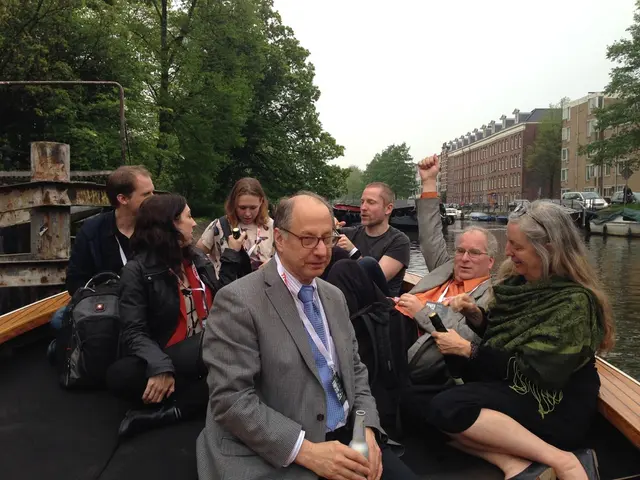In Quest of Eurovision Truth: A Call for Transparency
EU Legislators Intensify Pressure on Eurovision over Accusations of Manipulated Voting
Just coming off the heels of the 2025 Eurovision Song Contest, a stir has erupted surrounding the contest's integrity. Questions about televoting manipulation, particularly in favour of Israel's entry, have intensified, causing a wave of concern among broadcasters across several European nations.
Twelve courageous MEPs from socialist, leftist, green, and liberal groups have penned a letter to the European Broadcasting Union's (EBU) higher-ups, expressing their renewed apprehension regarding increasing concerns of irregularities tied to the 2025 contest. This appeal followed a groundswell of concern from national broadcasters, including the Netherlands' AVROTROS/NPO, Norway's NRK, Spain's RTVE, Slovenia's RTVSLO, Iceland's RÚV, Belgium's Flemish VRT, and Finland's Yle.
These broadcasters voiced their suspicions of televoting manipulation, raising questions about the role of state-backed promotion, especially concerning Israel's runner-up position in the contest, which allegedly benefited from the Israeli Government Advertising Agency (Lapam)'s campaigns. Ireland's RTÉ has formally requested access to the voting data, while VRT has publicly expressed doubts about continuing their participation in the contest if full transparency is not ensured.
"While the Eurovision Song Contest is meant to unite Europe through music and culture, recent developments have cast a shadow over its credibility and neutrality," Slovenian MEP Matjaž Nemec, who initiated the letter, told our site. Nemec criticised the involvement of national governments in promoting their acts, calling it a breach of the EBU's principles of fairness, impartiality, and independence.
The letter cites data from VRT revealing significant and unexplained discrepancies between viewer numbers and televoting participation during the 2023-2025 contests. "These trends are not easily explained by organic fluctuations in viewer enthusiasm and warrant further scrutiny," the letter reads, warning that the increasing number of broadcasters questioning their own data points to a deeper, systemic issue.
"This is not an isolated concern: it signals a broader problem that must be addressed," Nemec said. The MEPs have urged the EBU to take specific measures such as releasing complete voting data, authorising an independent audit, and implementing safeguards to prevent political interference in the contest.
"Without answers and accountability, Eurovision risks losing the trust of its audience and becoming a stage not for unity, but for manipulation," Nemec cautioned, adding that the European public deserves full transparency on this year's voting process.
To address these concerns, Eurovision Song Contest director Martin Green has issued an open letter addressing questions about transparency and the integrity of the voting process. Green acknowledged the issues raised by broadcasters and confirmed that they would be discussed at the upcoming EBU Reference Group meeting.
He pointed out that while promotional efforts by participating countries are permitted and typical in the music industry, the EBU is reviewing whether such campaigns could unduly influence public voting. Additionally, Green noted that Eurovision's voting system incorporates "multiple security layers" and is overseen by a team of over 60 professionals across Cologne, Vienna, and Amsterdam, while the voting is managed by Once Germany GmbH and independently verified by EY (Ernst & Young).
However, regarding the current rule limiting votes to 20 per payment method per person, Green stated that there is no evidence this affects the results. Yet, the issue will be re-examined as part of the post-contest review process. The EBU remains in constant contact with broadcasters, taking their concerns seriously and providing clarification when requested.
- The discussions surrounding the Eurovision Song Contest's integrity have expanded to include political arenas, as policy-and-legislation discussions have been initiated by twelve MEPs from various European groups.
- A professional sports organization like the European Broadcasting Union (EBU) is facing criticism from the sports-betting industry due to allegations of irregularities in recent Eurovision contests, casting doubts on its fairness and impartiality.
- The ongoing controversy surrounding the 2025 Eurovision Song Contest has sparked debates in the general-news and crime-and-justice sectors, with allegations of voter manipulation and concerns about state-backed promotion affecting the contest's outcomes.








